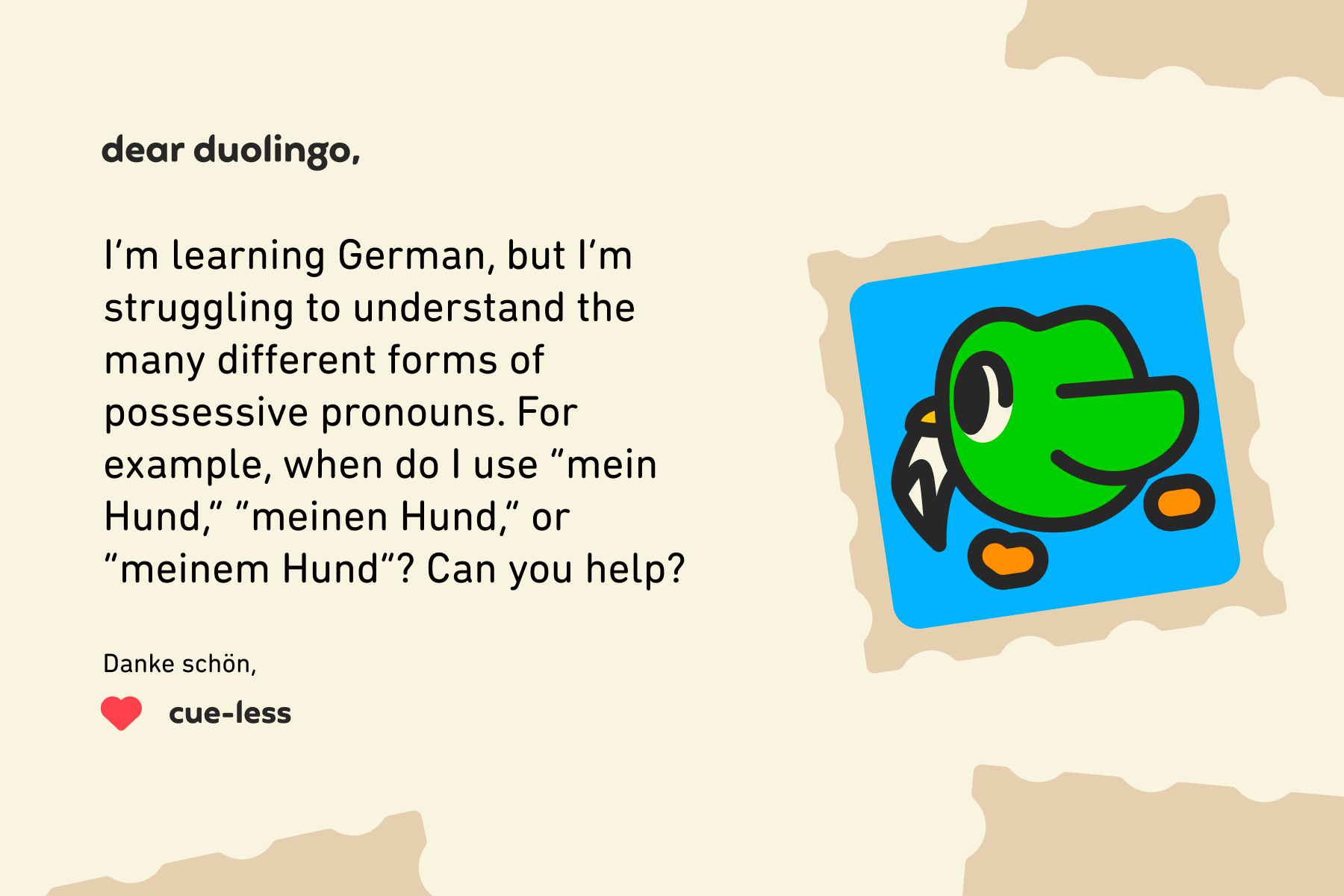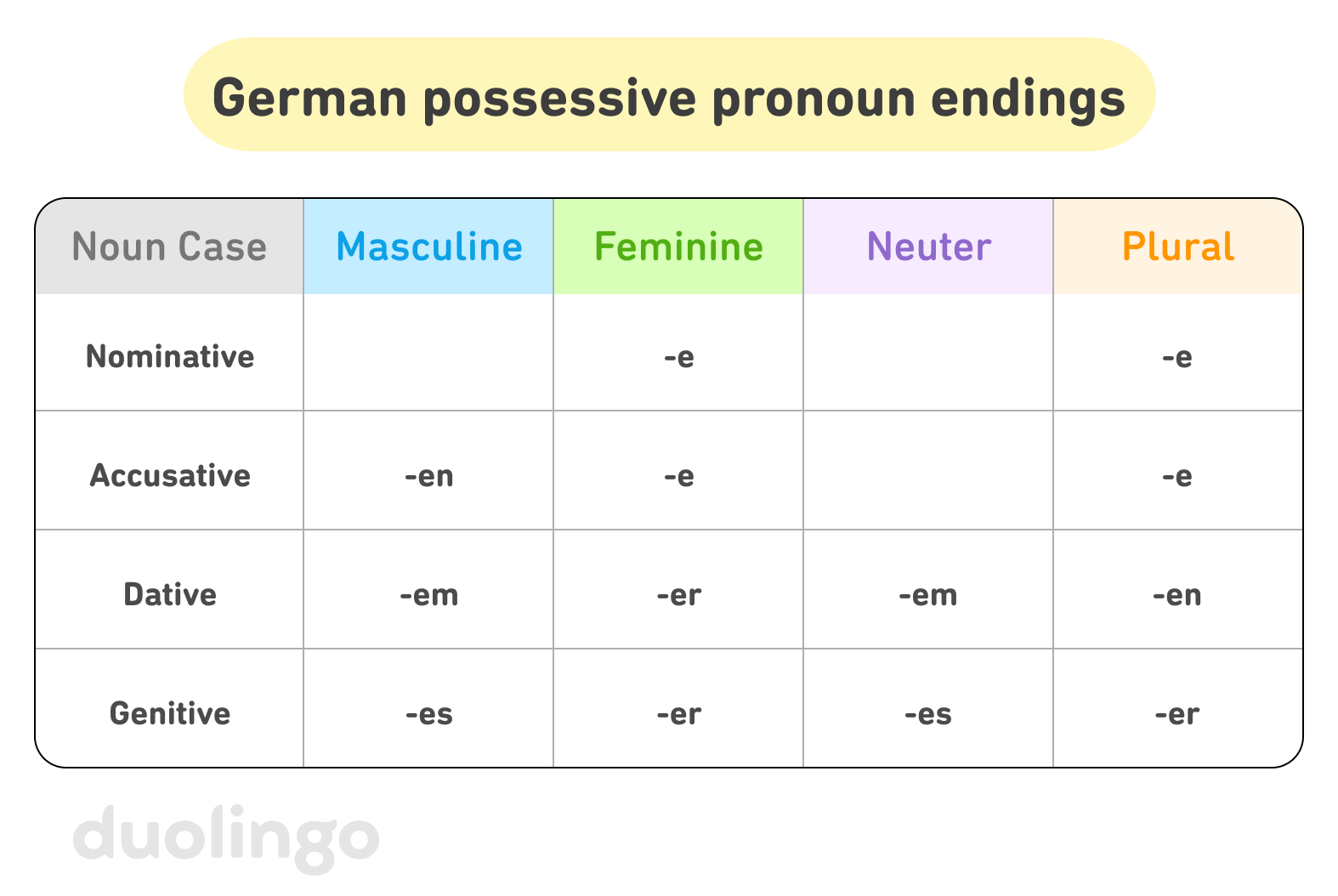Welcome to another week of Dear Duolingo, an advice column just for learners. Catch up on past installments here.
Hallo, dear learners! It’s Dr. Kristina Schoen and Stefanie Schantl, and we’re back this week with another Dear Duolingo post all about German! Today, we’re tackling a question that comes up for many German learners. Let’s take a look!
Our question this week:

You’re totally right, Cue-less—German has a lot of these words with many different forms. Other learners have written to us with the very same question, so you're not alone in your confusion! Thankfully, there are rules about which version to use, and even some helpful patterns to look for. We’ll go through all of them step by step.
In this post:
- How to choose the correct ending for German possessive pronouns
- How to choose the correct base form for German possessive pronouns
- Complete list of German possessive pronouns
Choosing the correct ending for German possessive pronouns
In German, you say Mein Hund ist immer hungrig (My dog is always hungry), but Ich füttere meinen Hund (I’m feeding my dog), and the million-dollar question is: why?
The answer lies in the fact that all German nouns have both grammatical gender and case. Any word related to a noun (like pronouns or articles) has to match the noun’s gender and case. So what you’re seeing in forms like meinem vs. meinen is the interaction of the two. Let’s take a look at each on its own.
Grammatical gender in German possessive pronouns
German has three grammatical genders: masculine, feminine, and neuter. You’ll see these reflected in the endings of possessive pronouns. Imagine you have three pets—a dog, a cat, and a horse. To tell people how well-behaved all three of them are, you could say:
| Grammatical gender | Sentence |
|---|---|
| Masculine | Mein Hund ist brav. My dog is well-behaved. |
| Feminine | Meine Katze ist brav. My cat is well-behaved. |
| Neuter | Mein Pferd ist brav. My horse is well-behaved. |
As you can see, Hund and Pferd use the same pronoun (mein). That’s because most masculine and neuter possessive pronoun forms are identical. For Katze, an -e is added to mein, making it meine. That’s because Katze is a feminine noun!
Noun case in German possessive pronouns
Grammatical gender isn’t where the story ends, though. German also has four different noun cases: nominative, accusative, dative, and genitive. A noun’s case tells you something about its role in the sentence. You’ll see these reflected in the endings of possessive pronouns, too:
| Noun case | Sentence with masculine noun |
|---|---|
| Nominative | Mein Hund ist immer hungrig. My dog is always hungry. |
| Accusative | Ich füttere meinen Hund. I’m feeding my dog. |
| Dative | Der Knochen gehört meinem Hund. The bone belongs to my dog. |
| Genitive | Der Bauch meines Hundes ist groß. My dog’s belly is big. |
Notice how the possessive pronoun changes for every case: mein, meinen, meinem, and meines. That’s because the dog (Hund) is used in a different grammatical context in each sentence, and each context gives you a clue about which ending to use for its possessive pronoun.
Putting the two together: grammatical gender and noun case in German possessive pronouns
We’ve seen what the forms of my look like for masculine nouns. But what about feminine nouns (like Katze) and neuter nouns (like Pferd)? Well, they also change, but the patterns aren’t exactly the same as for masculine nouns:
| Noun case | Sentence with feminine noun |
|---|---|
| Nominative | Meine Katze ist immer hungrig. My cat is always hungry. |
| Accusative | Ich füttere meine Katze. I’m feeding my cat. |
| Dative | Die Milch gehört meiner Katze. The milk belongs to my cat. |
| Genitive | Der Bauch meiner Katze ist groß. My cat’s belly is big. |
| Noun case | Sentence with neuter noun |
|---|---|
| Nominative | Mein Pferd ist immer hungrig. My horse is always hungry. |
| Accusative | Ich füttere mein Pferd. I’m feeding my horse. |
| Dative | Die Karotte gehört meinem Pferd. The carrot belongs to my horse. |
| Genitive | Der Bauch meines Pferdes ist groß. My horse’s belly is big. |
In short, these are the forms of mein- (my) for all grammatical genders and noun cases:
| Noun case | Masculine | Feminine | Neuter |
|---|---|---|---|
| Nominative | mein | meine | mein |
| Accusative | meinen | meine | mein |
| Dative | meinem | meiner | meinem |
| Genitive | meines | meiner | meines |
What about plural nouns?
Of course, you can also talk about plural nouns (like all of your pets) in German. Those possessive pronouns use specific endings, too:
| Noun case | Sentence with plural noun |
|---|---|
| Nominative | Meine Haustiere sind immer hungrig. My pets are always hungry. |
| Accusative | Ich füttere meine Haustiere. I’m feeding my pets. |
| Dative | Das Bett gehört meinen Haustieren. The bed belongs to my pets. |
| Genitive | Die Bäuche meiner Haustiere sind groß. My pets’ bellies are big. |
However, great news: You don’t need to pay attention to a noun’s grammatical gender if it’s in the plural. Possessive pronouns for plural nouns don’t change according to gender, so the ending will be the same, whether you’re talking about Hunde (dogs), Katzen (cats), or Pferde (horses):
| Noun case | Plural possessive pronoun |
|---|---|
| Nominative | meine |
| Accusative | meine |
| Dative | meinen |
| Genitive | meiner |
Choosing the correct base form for German possessive pronouns
Once you’ve memorized those endings, you already know the hardest part of German possessive pronouns! To complete the puzzle, though, you also need to pay attention to who is doing the possessing. That means keeping track of the grammatical person of the possessor (For example, is it my dog or your dog?), and, if it’s the third person singular, the grammatical gender as well (Is it his dog or her dog?). These two factors determine the base form of a possessive pronoun (mein-, dein-, sein-, ihr-, and so on), to which the correct ending is added.
These are the different base forms for German possessive pronouns:
| Person | Singular / Plural | Gender | Possessive pronoun base form |
|---|---|---|---|
| 1st | Singular | N/A | mein (my) |
| 2nd | dein (your) | ||
| 3rd | Masculine | sein (his) | |
| Feminine | ihr (her) | ||
| Neuter | sein (its) | ||
| 1st | Plural | N/A | unser (our) |
| 2nd | euer (your) | ||
| 3rd | ihr (their) |
You then add the correct ending to the base form. You’ve already seen these endings with mein-, and the good news is that they’re the same for all other base forms, too:

And tada! You’re ready to talk about the possessing of anything by anyone! Now you know why it’s Mein Hund ist immer hungrig (because Hund is masculine and in the nominative case), but Ich füttere meinen Hund (because Hund is in the accusative case here).
The case for starting small when it comes to German cases!
Remember that many patterns are repeated across possessive pronouns, so you don’t actually have to memorize dozens of distinct words. Start with the words that you use most often, and keep returning to these tables as a helpful resource as you progress.
For more answers to your language, learning, and German questions, get in touch with us by emailing dearduolingo@duolingo.com.
Appendix: All German possessive pronouns and their forms
First person singular
| Noun case | Masculine | Feminine | Neuter | Plural |
|---|---|---|---|---|
| Nominative | mein | meine | mein | meine |
| Accusative | meinen | meine | mein | meine |
| Dative | meinem | meiner | meinem | meinen |
| Genitive | meines | meiner | meines | meiner |
Second person singular
| Noun case | Masculine | Feminine | Neuter | Plural |
|---|---|---|---|---|
| Nominative | dein | deine | dein | deine |
| Accusative | deinen | deine | dein | deine |
| Dative | deinem | deiner | deinem | deinen |
| Genitive | deines | deiner | deines | deiner |
Third person singular, grammatically masculine possessor
| Noun case | Masculine | Feminine | Neuter | Plural |
|---|---|---|---|---|
| Nominative | sein | seine | sein | seine |
| Accusative | seinen | seine | sein | seine |
| Dative | seinem | seiner | seinem | seinen |
| Genitive | seines | seiner | seines | seiner |
Third person singular, grammatically feminine possessor
| Noun case | Masculine | Feminine | Neuter | Plural |
|---|---|---|---|---|
| Nominative | ihr | ihre | ihr | ihre |
| Accusative | ihren | ihre | ihr | ihre |
| Dative | ihrem | ihrer | ihrem | ihren |
| Genitive | ihres | ihrer | ihres | ihrer |
Third person singular, grammatically neuter possessor
| Noun case | Masculine | Feminine | Neuter | Plural |
|---|---|---|---|---|
| Nominative | sein | seine | sein | seine |
| Accusative | seinen | seine | sein | seine |
| Dative | seinem | seiner | seinem | seinen |
| Genitive | seines | seiner | seines | seiner |
First person plural
| Noun case | Masculine | Feminine | Neuter | Plural |
|---|---|---|---|---|
| Nominative | unser | unsere | unser | unsere |
| Accusative | unseren | unsere | unser | unsere |
| Dative | unserem | unserer | unserem | unseren |
| Genitive | unseres | unserer | unseres | unserer |
Second person plural
| Noun case | Masculine | Feminine | Neuter | Plural |
|---|---|---|---|---|
| Nominative | euer | eure | euer | eure |
| Accusative | euren | eure | euer | eure |
| Dative | eurem | eurer | eurem | euren |
| Genitive | eures | eurer | eures | eurer |
Third person plural
| Noun case | Masculine | Feminine | Neuter | Plural |
|---|---|---|---|---|
| Nominative | ihr | ihre | ihr | ihre |
| Accusative | ihren | ihre | ihr | ihre |
| Dative | ihrem | ihrer | ihrem | ihren |
| Genitive | ihres | ihrer | ihres | ihrer |
The formal paradigm (singular and plural)
| Noun case | Masculine | Feminine | Neuter | Plural |
|---|---|---|---|---|
| Nominative | Ihr | Ihre | Ihr | Ihre |
| Accusative | Ihren | Ihre | Ihr | Ihre |
| Dative | Ihrem | Ihrer | Ihrem | Ihren |
| Genitive | Ihres | Ihrer | Ihres | Ihrer |
